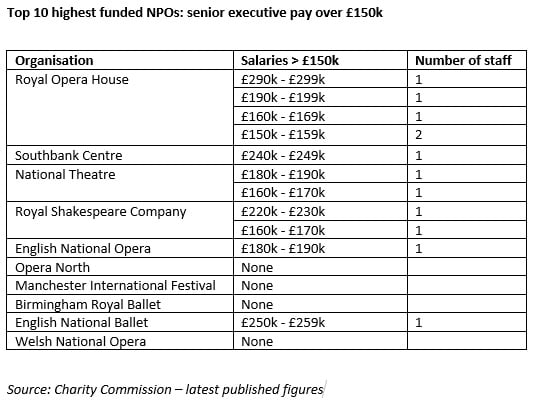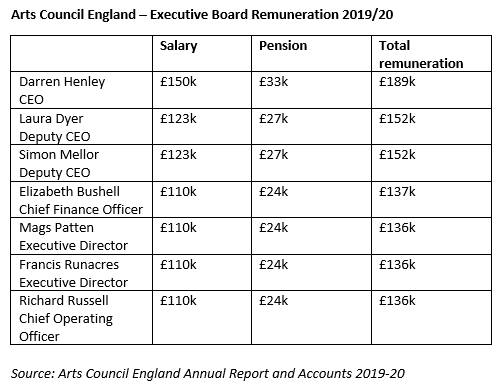
Top staff at the Royal Opera House, pictured, will have to agree to take pay cuts to access emergency funding
Photo: Norio Nakayama
Freeze or cut pay to get funding, sector told
Funding bodies will enforce "pay restraint" at the organisations getting recovery money – but won't be exercising the same restraint themselves.
Arts organisations must freeze or cut the pay of their senior staff to receive emergency funding.
Guidance released by Arts Council England (ACE) says that successful applications for a share of the £500m Culture Recovery Fund will have to agree to "exercise pay restraint for at least 18 months" where it is legally possible, including a pay freeze for all "senior staff" and 10% pay cuts for anyone on more than £150,000 per year.
But ACE and DCMS, which set these conditions, will not be exercising the same restraint themselves: "This is only applicable to organisations facing financial difficulty that need to apply to this particular Government programme," an ACE spokesperson said.
READ MORE:
- Arts gets one third of £1.57bn Culture Rescue Fund
- Government pivots back to allowing indoor performance
At this stage, the funders have given no indication as to who they consider "senior staff" or what other measures might fall under the definition of "pay restraint".
National Portfolio Organisations (NPOs) and other applicants that receive funding will have prove they made the cuts and freezes required in a post-programme evaluation.
The big earners
Pay cuts for some of the cultural sector's highest earners could run into the hundreds of thousands of pounds.
Analysis of annual reports and accounts reveals where the impact of these funding conditions will be most keenly felt. If the top 10 highest-funded NPOs accepted the bailout conditions – which they aren't contractually obliged to do – many top executives would take a 10% pay cut. Together, the savings would amount to around £220,000.

It's not just these NPOs where bosses are pulling in big salaries: pay for top earners exceeds £150,000 at a wide range of organisations including Cambridge Arts Theatre (£220,000), London Philharmonic (£210,000+) and Snape Maltings (£190,000+).
No cuts for ACE
Asked whether any of its staff would take pay cuts, ACE said none of its employees earn more than £150,000.
But when pensions and bonuses are taken into account, its senior staff's earnings rise significantly.

An ACE spokesperson said CEO Darren Henley has decided not to take a pay rise this financial year. He will continue to donate his roughly £17,500 bonus, as he has done in recent years.
His earnings for 2020/21 will be 12% lower than what he's contractually entitled to – meaning he will still be paid about £150,000.
The total remuneration for ACE's executive team now tops £1m. The median remuneration for ACE staff is £31,975.
Culture Secretary Oliver Dowden earns £149,437 per year from his salaries as an MP and a Secretary of State.
DCMS Minister Caroline Dinenage earns a total of £113,612, while DCMS' most senior civil servant Sarah Healey is on £160,000.
Uncertain path
Organisations will be asked to provide "best value for money plans" as the UK charts a slow return to normality.
ACE acknowledges in its guidance that the lack of international tourism and social distancing requirements mean organisations won't be working as usual: "We expect this will continue to constrain demand for many organisations, both in terms of venue capacity but also consumer demand".
"Organisations will want to consider how their typical customer base is likely to respond to continued social distancing measures."
Although indoor performances have been given the green light, "the path of the virus is uncertain and it is therefore impossible to predict between now and March" how circumstances might change.
"Any further steps to continue to open up the economy will be dependent on the state of the epidemic at the time and the trajectory of cases being stable or remaining in decline. Similarly it will be necessary that local outbreaks are identified quickly and quashed and a resurgence in the virus may require tighter restrictions," the guidance says.
"It is in that context that we ask organisations to set out best value for money plans within current guidelines, whilst accepting that the exact path may vary."
Join the Discussion
You must be logged in to post a comment.